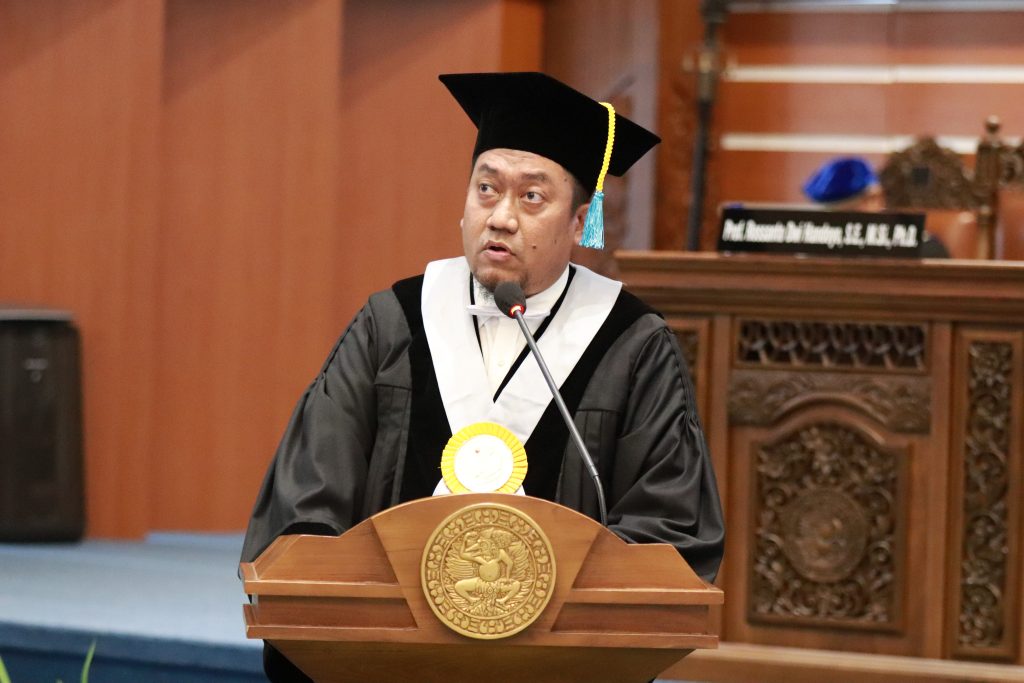UNAIR NEWS – Rector of Universitas Airlangga (UNAIR) Prof. Mohammad Nasih officially inaugurated Prof. Rossanto Dwi Handoyo SE MSi PhD as professor on Wednesday, May 10, 2023, in Garuda Mukti Hall, MERR-C Campus, UNAIR. He became the 34th active professor at the Faculty of Economics and Business (FEB). On that occasion, Prof. Rossanto delivered an oration about Indonesia’s export opportunities amid international geo-political issues for SMEs.
He revealed that as a small open economy country, Indonesia’s economy is vulnerable to global economic conditions. This influence does not only come from economic conditions, but also geo-political, social, and even health conditions.
“In the last ten years, the international geo-political map has developed very dynamically, starting from the development of Brexit in Europe, the US and China trade war, changes in the international political constellation in the Gulf countries, the outbreak of the Covid-19 pandemic, to the war between Russia vs Ukraine which has already happened for a year,” he said.
Furthermore, the wider trade opportunities and increasing dependency on the world economy and trade have led to fluctuating Indonesia’s economic conditions following the rhythms of global trade.
Also, global economic conditions are improving, especially after the Covid-19 pandemic and the Russo-Ukranian war. It also had an impact on Indonesia’s trade balance which was able to reach the highest record in 2021 and 2022.
Free Trade Agreement
Then, he explained that at the same time, the government continues to intensify export opportunities by establishing various free trade agreements (FTAs) with other countries.
This effort is considered effective in increasing the opportunities for Indonesian export products to reach partner countries with more freedom. Moreover, export products from partner countries can also enter the domestic market.
“Several studies show that Indonesia’s trade agreements with partner countries have encouraged trade creation. The establishement of free trade agreements has succeeded in increasing trade among participating countries and encouraging increased domestic production,” explained the international economist.
Encourage SMEs to export
Furthermore, the Department of Development Economics lecturer hoped that Small and Medium Enterprises (SMEs) will be able to take advantage of widening market opportunities, not only large exporters as SMEs in Indonesia have been able to absorb 60 percent of the domestic workforce and produce quality products.
“Currently, the number of our exporters is not growing significantly compared to our neighboring countries in ASEAN, which are already export-oriented even though they are in the class of SMEs. In addition, the number of SMEs acting as producer-exporters is still very limited. Most of them act only as traders.” he explained.
Rossanto said there were several reasons why SMEs in Indonesia did not dare to export. First, they are more focused on selling domestically. Second, they still consider export to be a difficult and convoluted procedure. Third, they are afraid of the high taxes. Lastly, they do not have the required certification.
“So, when there are SMEs that get buyers and can export, many use undername. It is a term used by SMEs who are going to export but do not use their company name for many reasons,” he concluded. (*)
Author: Rafli Noer Khairam
Editor: Khefti Al Mawalia









